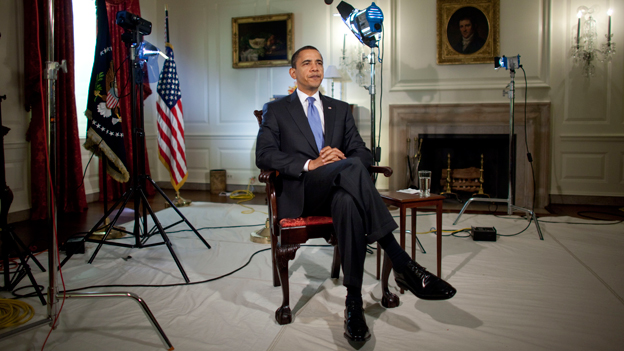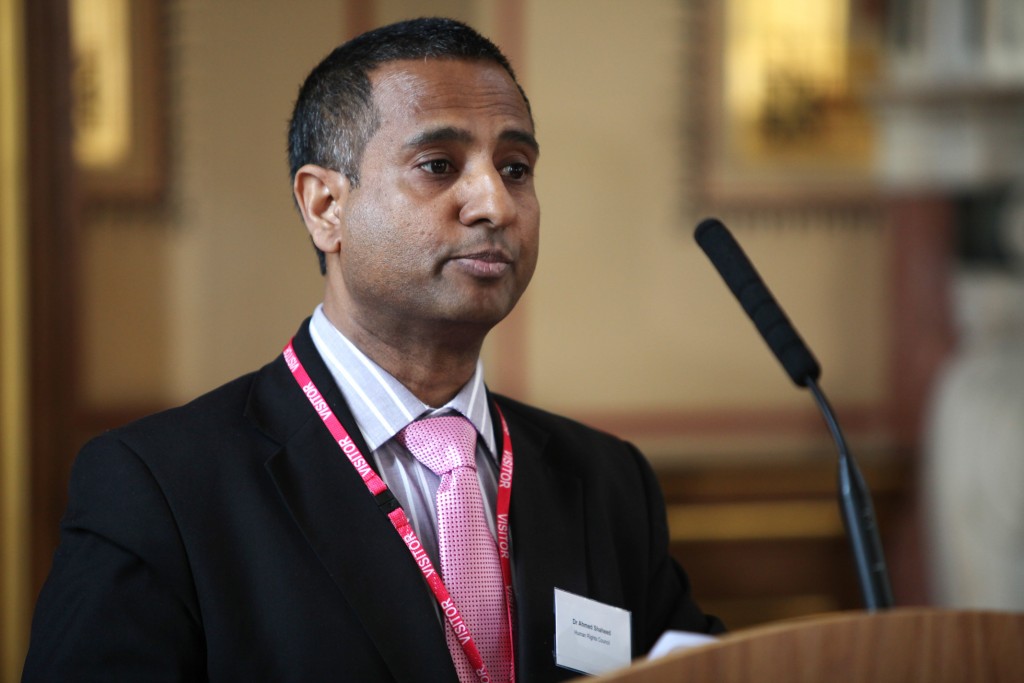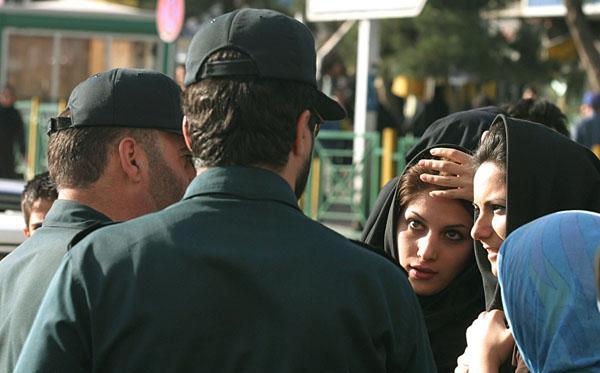Over the past few years, the UN has gotten more and more serious about tackling Iran’s human rights abuses. But at the same time, under the Obama administration the United States has only grown closer to the Islamic Republic. Why?
On March 19, in honor of Nowruz, the Persian New Year, President Barack Obama sent greetings to Persians living both inside and outside Iran. Obama was not the first American president to mark Nowruz—this particular tradition was begun by President George H.W. Bush in 1992—but he was the first to refer to Iran with its official prefix, “The Islamic Republic of…,” signaling his willingness to regard the Islamist regime as an enduring political entity, rather than a temporary aberration.
In contrast, when Bill Clinton sent Nowruz greetings in 1998, he expressed regret over the “estrangement of our two nations,” and added, “I hope that the day will soon come when we can enjoy once again good relations with Iran”—implying that these relations could be established with or, more likely, without an Islamist regime in charge. In 2008, George W. Bush declared, “The people of the United States respect the people of Iran. … We respect the traditions of Iran, the great history of Iran. We have differences with the government, but we honor the people, and we want the people to live in a free society.” The following year, Bush’s distaste for the Iranian theocracy was cast aside when Obama opened his remarks with the phrase, “I would like to speak directly to the people and leaders of the Islamic Republic of Iran.”

President Barack Obama records a video on the occasion of the holiday of Nowruz, March 18, 2009. Photo: The White House / Wikimedia
In those 2009 greetings, Obama articulated an “Islamic Republic” doctrine that would shape America’s courtship of Iran ever since. “The United States wants the Islamic Republic of Iran to take its rightful place in the community of nations,” he said.
You have that right—but it comes with real responsibilities, and that place cannot be reached through terror or arms, but rather through peaceful actions that demonstrate the true greatness of the Iranian people and civilization. And the measure of that greatness is not the capacity to destroy, it is your demonstrated ability to build and create.
Obama made no mention of the Iran’s systemic human rights abuse back then, when the fanatical millenarian Mahmoud Ahmadinejad was still president, and he made no mention of it in 2015, with the ostensibly moderate Hassan Rouhani now in office. While Obama’s 2009 Nowruz address was ambiguous enough to allow us to imagine that human rights might be an element of American engagement with Iran, his 2015 address, which followed several years of public and private engagement with Tehran, effectively called for a united front with the “Islamic Republic” against those “people, in both our countries and beyond, who oppose a diplomatic resolution [of the Iranian nuclear question]. My message to you—the people of Iran—is that, together, we have to speak up for the future we seek.”
In 2009, Obama asked that Americans and Iranians—he didn’t distinguish between government and people at this critical juncture of his speech—not be defined by their differences. This year, he went further, speaking of strategic interests shared by two nations that are centuries apart when it comes to basic human rights and freedoms.
Even more striking, core liberties like free speech and freedom from torture were absent from Obama’s list of “opportunities” that a deal would bring to the Iranian people. In his Nowruz greetings, Obama promised more “trade and ties with the world.”
More foreign investment and jobs, including for young Iranians. More cultural exchanges and chances for Iranian students to travel abroad. More partnerships in areas like science and technology and innovation. In other words, a nuclear deal now can help open the door to a brighter future for you—the Iranian people, who, as heirs to a great civilization, have so much to give to the world.
To Obama, it seems, the heart of the Islamic Republic is essentially benign. He said, for example, that “Ayatollah Khamenei has issued a fatwa against the development of nuclear weapons,” even though many analysts have raised serious doubts about both the wording and the significance of the fatwa. He also mentioned that “President Rouhani has said that Iran would never develop a nuclear weapon.” He appears to believe that Iran’s leaders are ultimately prudent and sensible men.
There is no place in this vision for a very different picture of Iran: A state whose regime lost any semblance of legitimacy when it crushed student-led democracy protests in 2009, and treats the human beings it rules not as ends in themselves, but as a means to an end. An Iran where government and people are sharply distinct from, and more and more in opposition to each other.
A few days before Obama made his Nowruz speech, Ahmed Shaheed, the UN-appointed Special Rapporteur on the situation of human rights in the Islamic Republic of Iran, issued his seventh report to the United Nations Human Rights Council. Shaheed is a diplomat, academic, and pro-democracy politician from the Maldives, a predominantly Muslim island in the Indian Ocean that, as his Twitter feed records in animated fashion, has itself experienced a severe erosion of democratic rights over the last several years. He also sits on the Board of the Universal Rights Group, a think-tank located in Geneva.
Shaheed is the first incumbent in the Special Rapporteur’s position, having been appointed in 2011 just as the Human Rights Council began an expansion of its monitoring of specific states. Over the next three years, it added further mandates to include North Korea, Syria, Mali, the Central African Republic and other countries where human rights are routinely and systemically abused—a welcome development, for once, in a body that is still disproportionately concerned with attacking Israel.
During his term, Shaheed has been diligent in producing reports that document, in sober and careful fashion, the Iranian regime’s contempt for the basic human freedoms enshrined in the UN’s own charter. Hillel Neuer, the executive director of UN Watch, a Geneva-based NGO that documents how authoritarian regimes around the world manipulate the UN to their own ends, told me that Shaheed’s is “one of the rare mandates on … an oppressive regime and you have a mandate holder who’s running with it. Shaheed’s active on Twitter, he’s active on side events, and he really seems to care.”
In August 2014, Shaheed authored a report in which he noted that Iran’s penal code
Continues to allow for juvenile executions and retains the death penalty for activities that do not constitute “most serious crimes” in line with the safeguards guaranteeing protection of the rights of those facing the death penalty….They include adultery, recidivist alcohol use, drug possession and trafficking, and some crimes resulting in convictions for moharebeh (commonly translated as “enmity against God,” but translated by the Government as a crime in which “a person brandishes or points a weapon at members of the public to kill, frighten, and coerce them”) or mofsed fel-arz (“corruption on Earth”).
These and similar facts demonstrate why Iran stands out even among those states whose record on human rights is unremittingly criminal. Execution of juveniles, execution for adultery, execution for blasphemy, punishment instead of treatment for alcohol and drug abusers—these are crimes against humanity that could potentially become a case for the International Criminal Court (ICC). It is also worth noting that, under Rouhani, there has been an increase in the number of executions carried out by the regime.
Shaheed’s 2015 report is similarly grim, stating,
The use of capital and other forms of cruel, inhumane and degrading punishment persist at alarming rates. This is especially alarming given the frequent application of the death penalty for crimes not considered “most serious” under international human rights law, and considering policies and practices previously identified by the United Nations human rights mechanisms that continue to challenge the administration of justice.
When I spoke to Shaheed shortly after the release of his latest report, he cautiously expressed hope that there were figures around Rouhani who might be open to a more substantive engagement on human rights. He also speculated that a lifting of sanctions in the context of a nuclear deal might also lead to greater international engagement with Iran, “and therefore exposure and pressure on Iran to improve its human rights record.” Shaheed told me, however, that “overall the country is getting worse on human rights practices, certainly since I’ve been observing it.”
In Shaheed’s view, the right to life is the most pressing of the myriad human rights concerns currently in play in Iran. “At least 753 individuals were reportedly executed in 2014 (the highest total recorded in the past 12 years),” his report revealed. “This includes the execution of 25 women and 53 public executions.”
I asked Shaheed what requests should be put to the Iranian regime in the light of that record. “I would say that a moratorium on the death penalty is the most urgent step they need to consider,” he replied. “I say that given the very high number of executions in the country, plus the fact that this has now been widened to include juvenile and political crimes, and corruption as well.”
Iran’s systematic discrimination against women is another pillar of its theocratic regime. “Sitting here at the UN for the last eleven years, I hardly hear anyone talk in any meaningful way about the rights of women in Iran,” Neuer told me.
Shaheed’s reporting is ideally placed to break that particular silence, at least in the corridors of the UN. “Recent legislative attempts made by the Iranian Parliament appear to further restrict the rights of women to their full and equal enjoyment of internationally recognized rights,” he wrote.

Ahmed Shaheed, the UN Human Rights Council Special Rapporteur on Iran, speaks at the British Foreign and Commonwealth Office, April 15, 2013. Photo: Foreign and Commonwealth Office / Wikimedia
The discrimination, said Shaheed, is especially pronounced in the spheres of education and employment. “A few years ago, nearly 70 percent of the university population was made up of women, but there’s been a policy established in the past two or three years designed to push women back from the public sphere,” he told me. “The first element of this was the imposition of quotas on women’s access to university, thereby in a matter of two years reducing the number of women enrolled at university to less than 50 percent of the total university population.”
When it comes to employment, Shaheed continued, female participation in the workforce “remains very, very low.”
New legislation and policies are in the pipeline which would further diminish women’s’ access to the workplace. One of these bills is the Family Consolidation Bill, under which employers are required to give first preference to married men with children, followed by married men without children, and then a lot later, to women. So in this kind of gender-based hierarchy, the situation of women in the country is going to get worse.
The situation is equally grim with regard to freedom of assembly, speech, and religion. Those wishing to set up a political party must first submit their request to a nine-member Party Commission that includes officials from the intelligence ministry. Shaheed’s 2015 report states, “The applicant’s statute and manifesto must also explicitly state adherence to the Constitution and the principle of the guardianship of the Islamic jurist”—the velayat-e faqih system established by Ayatollah Khomeini following the 1979 Islamist takeover.
Of all Iran’s beleaguered religious minorities, which include Sunni Muslims, Jews, and Christians, it is the adherents of the Baha’i faith that are in the most vulnerable position. According to Shaheed’s report, Baha’is “continue to face discrimination, arrest, and arbitrary detention in connection with their religion. Between September and December 2014, security forces in the cities of Isfahan, Tehran, Shiraz, Hamedan, Karaj, and Semnan reportedly arrested at least 24 Baha’is, bringing the total number of Baha’is in detention to 100.” Moreover, the regime’s attitude is unashamedly bigoted. “Incitement against Baha’is also appeared to continue this past year,” Shaheed’s report stated. “On 15 December 2014, Ayatollah Bojnourdi (a high-ranking cleric and a former member of Supreme Judicial Council) stated, ‘We never say that Baha’is have the right to education; Baha’is don’t even have citizenship rights.’”
Perhaps the most disturbing aspect of the Obama administration’s outreach to Iran is the resulting impression of the regime as being, at worst, mildly authoritarian. The omission of fundamental human rights reform as a necessary measure in permitting, as Obama put it, “the Islamic Republic of Iran to take its rightful place in the community of nations,” places the onus on human rights organizations to prevent any further polishing of Iran’s image.
Indeed, as far as the Iranian regime is concerned, there isn’t a problem to begin with. Its official response to Shaheed’s report thundered, “Designating a country like Iran that has constantly fulfilled its commitments toward its citizens and international community [sic] is unjustifiable, meaningless, and absolutely destructive.”
International scrutiny is not something that is welcomed by Iran’s rulers, whether in regard to their nuclear facilities or to their woeful human rights record. With Iranian power now on the ascent from Syria to Yemen, power is firmly in the hands of the most influential, hardline elements in the regime’s complex governing structure, particularly the Iranian Revolutionary Guards Corps, which has been directing ground operations against Islamic State terrorists in Iraq and Syria. These are elements that will always regard such constructs as women’s rights and the rights of religious minorities as a suspect Western import.
The contention that success in the nuclear negotiations will organically lead to progress in areas like human rights is therefore rather suspect. Consider, by way of example, the following episode:
In February 2014, a United Nations panel of experts issued a searing report on human rights abuses in North Korea, recommending that the “Security Council…refer the situation in the Democratic People’s Republic of Korea to the International Criminal Court for action in accordance with that court’s jurisdiction.” Bitterly stung by the report, the North Koreans embarked on a round of furious diplomacy to prevent this and other recommendations from being adopted. By November, however, their efforts had been rebuffed, with the UN General Assembly committee that oversees human rights voting 111-19, with 55 abstentions, in favor of an ICC prosecution against the North Korean leadership.
On November 20, two days after the resolution was adopted, North Korea threatened to carry out a nuclear test for the first time since 2013, asserting that its “war deterrence capabilities” would be strengthened “to guard against forceful American invasion plots.” No test was carried out, because there was no need for one. It was sufficient for North Korea to remind the world that its nuclear arsenal—whose very existence violates the “Agreed Framework” deal negotiated with the U.S. in 1994—will be launched if, to quote North Korea’s ambassador in London, “a sparkle of a fire is made on the Korean peninsula.”
It seems, then, that ownership of weapons of mass destruction does not make authoritarian and totalitarian regimes improve their behavior. Nor does it make them more amenable to international incentives to do so, especially when it comes to the most important issue—their human rights records. To the contrary, as North Korea demonstrates, it makes them far less inclined to compromise, and boosts their confidence in the use of violence to suppress domestic opponents. Moreover, since Pyongyang has accused Marzuki Darusman, the UN’s independent expert on human rights violations in that country, of misusing “human right issues as a means to dismantle or overthrow the country’s system,” it is reasonable to conclude that an initiative like an ICC prosecution would be regarded by the Kim regime as precisely that “sparkle of fire” that could trigger nuclear war.
All of which sets a gravely negative precedent for the cause of human rights not just in North Korea, probably the world’s most heinous offender, but in other countries too. Countries whose belligerent rulers are, quite correctly, taking strategic advantage of an international climate profoundly impacted by the current U.S. administration’s belief that a chastened approach to the rulers of the Islamic world is the best way of avoiding another mass deployment of American troops in the Middle East. First and foremost, countries like Iran.
![]()
Banner Photo: Morteza Bahmani / flickr





